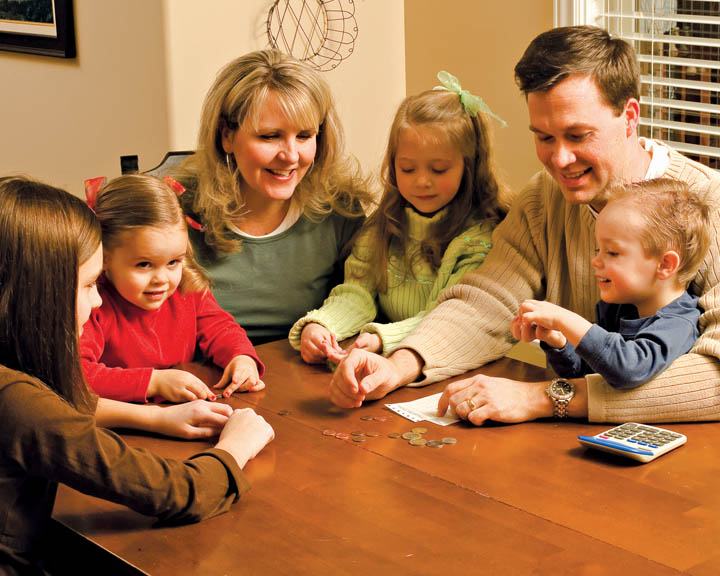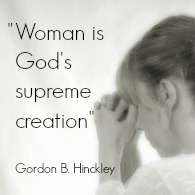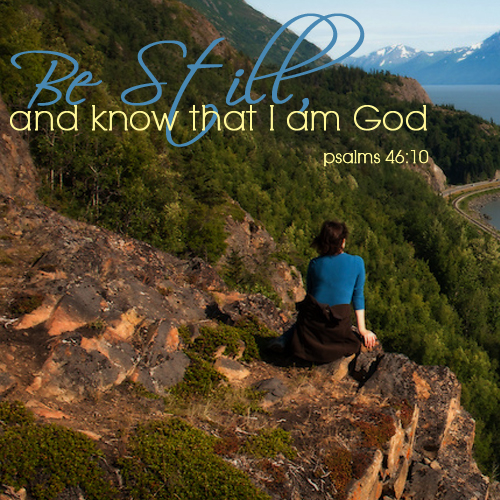In a world that has been struggling with the debate over equality for women for thousands of years, but much more focused on fighting for equal rights over the past several decades, I feel a great sense of security and joy in my understanding of what it means to be a Mormon woman. The Church of Jesus Christ of Latter-day Saints (often misnamed the Mormon Church) has clear doctrine about the worth of women. Though many women do not fully understand what this doctrine means to them, and thus feel deemed of lesser value than men, I have a strong relationship with God and Jesus Christ, and I know of their love for me. I read the scriptures and I serve in the capacities I am asked to in my local congregation, and I feel that I am worth just as much as anyone else in that congregation, regardless of gender.
 The Church of Jesus Christ of Latter-day Saints receives a great deal of criticism, as many other denominations have, about not giving equal rights to the women of their congregations. Women do not hold the priesthood in the “Mormon Church,” thus the assumption by many is that they are viewed as not being worth as much or not being as capable as men. I have never felt this way.
The Church of Jesus Christ of Latter-day Saints receives a great deal of criticism, as many other denominations have, about not giving equal rights to the women of their congregations. Women do not hold the priesthood in the “Mormon Church,” thus the assumption by many is that they are viewed as not being worth as much or not being as capable as men. I have never felt this way.
The priesthood is the power and authority to act in God’s name. He has set forth a pattern of organization for His church on the earth, and priesthood authority is the pattern by which He runs this organization. Worthy, righteous men are given the opportunity to receive the priesthood and serve under its pattern. They cannot ever use this power to further their own private interests. No personal gain can ever be obtained through the power of the priesthood; it is a strictly servicing power. It may only be used to further God’s work.
My understanding of what it means to be a Mormon woman tells my heart that the priesthood power is there to serve me and to help me fulfill my responsibilities, which are of no less importance than a man’s in his priesthood calling. Mormon doctrine, through revelation to living prophets, teaches that men and women have complementary roles and talents. I understand that my responsibilities as a woman are to nurture my children (“The Family: A Proclamation to the World”). This does not mean the only contributions I can or should make are as a mother, but this does mean to me that, if I am able to be a mother, this is not only what I have been asked to do, this is what I will be held accountable for. There are women who cannot bear children in this life. This does not make them of less worth than I; this means that they are called to bear different responsibilities right now. However, they are promised the same blessings in eternity as I am, if we are all faithful to the covenants we make.
 I recognize the importance of the priesthood in building up God’s kingdom on the earth. I recognize that in a theocracy, God is in charge. On the earth, in order for stability to be maintained and progression to be possible, one person must also ultimately be responsible. This person is the living prophet. The organization goes down from the prophet to local leadership. The smallest unit in The Church of Jesus Christ of Latter-day Saints is the family. The pattern and order continues through the priesthood to the father, the head of the family. This does not give him absolute control over the family; much more seriously, it gives him ultimate responsibility for the family.
I recognize the importance of the priesthood in building up God’s kingdom on the earth. I recognize that in a theocracy, God is in charge. On the earth, in order for stability to be maintained and progression to be possible, one person must also ultimately be responsible. This person is the living prophet. The organization goes down from the prophet to local leadership. The smallest unit in The Church of Jesus Christ of Latter-day Saints is the family. The pattern and order continues through the priesthood to the father, the head of the family. This does not give him absolute control over the family; much more seriously, it gives him ultimate responsibility for the family.
As a Mormon woman, I do not feel at all diminished by the fact that I do not hold the priesthood. I recognize the seriousness of the responsibilities I am given, and I appreciate that bearing my own responsibilities as well as those of the priesthood would be completely overwhelming. I am grateful for the pattern God has revealed, which gives me access to all the blessings of the priesthood, while allowing the responsibilities that accompany that calling to rest on someone else for now. I have quite enough to try and take care of.
I believe that it is very difficult for some women to resolve the conflict presented to them by the world’s view of equality compared to Mormon doctrine’s definition. Society’s view wants you to believe that equality means absolutely equal in every way. I feel applying this definition to what I understand of Mormon doctrine actually diminishes my worth. I am expected to bear significant responsibility on this earth. Whether that is as a mother right now, or for reaching out to others in love and understanding, I feel that these are both roles which women excel at far better than men. If someone is telling me I have to be equal to a man, that is devaluing the gifts that God has given me as a woman.
As a Mormon woman, fully understanding Mormon doctrine enforces the knowledge that there is nothing holding me back from progressing personally to salvation and exaltation with God other than myself. While I am capable of doing this on my own (meaning without a spouse, not without the Savior), I also recognize it would be a much easier task if I am partnered with someone who is also righteous who has different strengths than I do. We can, and should, bring assets to our spouse by building our individual strengths so that we can help one another become better people and closer to God.
In addition to bringing our talents together to share with my husband, I have also been asked to use my abilities to serve in the Mormon Church in many other ways. The clergy of the LDS (“Mormon”) Church is a lay clergy, meaning no one is paid for their time, but people are asked to serve in different capacities. The different capacities are called “callings” in the Mormon vernacular. I have had callings ranging from playing the piano during services to teaching youth about the scriptures to teaching classes for adults on the scriptures to serving in the Young Women organization and the Relief Society organization. I have served as both Young Women president and Relief Society president. The first is for young women between the ages of 12 and 18; the second is for women ages 18 and above.
Serving as president in each of these organizations is very time consuming, and the responsibilities are quite overwhelming. Taking upon myself the responsibility for the spiritual well-being of a group of girls who are still very naïve and unaware of the dangers in this world was intense. Taking upon myself the physical and spiritual responsibilities of women and the myriad complications which arise in their lives is also overwhelming. What pulled me through while I was serving in these callings was receiving personal revelation from God about how I should serve these young women and women. As presidencies of these organizations, women work closely with the male leadership of the congregation. The love that all parties involved feel for those they have been asked to take responsibility for is tangible. I have been grateful to serve in these callings, despite the huge time commitment and other sacrifices they require. It is fulfilling to help when the Lord asks you to.
Maxine Hanks, a woman who was excommunicated from The Church of Jesus Christ of Latter-day Saints as a result of her persistent journey into feminist theology and radical views, recently accepted the invitation from Mormon Church leaders to be rebaptized. Hanks spent periods after she was excommunicated as a scholar of Gnosticism and a nondenominational chaplain. Why would she be joyful about rejoining a church which she had apparently originally felt diminished women? Because she gained a more thorough understanding of Mormon doctrine. Hanks said, “I don’t think gender tensions in Mormonism are due to inequality in the religion, but due to invisibility of that equality. The equality is embedded, inherent in Mormon theology, history, texts, structures. Gender equality is built into the blueprints of Mormonism, but obscured in the elaborations. . . . The inherent gender equality in Mormonism just needs to be seen by extracting it from other distracting elements and contexts.”
Hanks gained an understanding of what I have felt: Mormon doctrine teaches that women are just as valuable as men. They are given different responsibilities, which are equal in importance. Now, I do not deny that there may be some cultural hindrances to the expression of that equality, but the issue of women not holding the priesthood does not fall under this category.
I find joy in being a Mormon woman and what I know that entails. I find power and strength in my personal relationship with God and my Savior and their love I feel for me. I am empowered by the understanding I have of Mormon doctrine and of my responsibilities as a Mormon woman. While I am not dependent upon any mortal man for my salvation (only on Jesus Christ), I recognize that my journey can certainly be made much easier by being coupled with a righteous man. I feel the blessings of the priesthood in my life and am strengthened by the covenants I have made through its power, but I do not feel like I am lessened in value because I do not hold that power.
By Doris
About Keith L. Brown
Keith L. Brown is a convert to The Church of Jesus Christ of Latter-day Saints, having been born and raised Baptist. He was studying to be a Baptist minister at the time of his conversion to the LDS faith. He was baptized on 10 March 1998 in Reykjavik, Iceland while serving on active duty in the United States Navy in Keflavic, Iceland. He currently serves as the First Assistant to the High Priest Group for the Annapolis, Maryland Ward. He is a 30-year honorably retired United States Navy Veteran.



